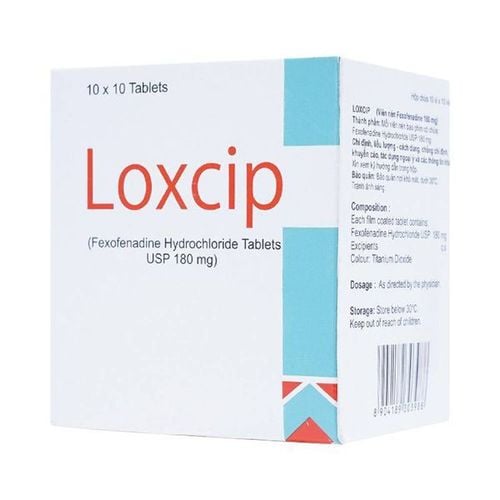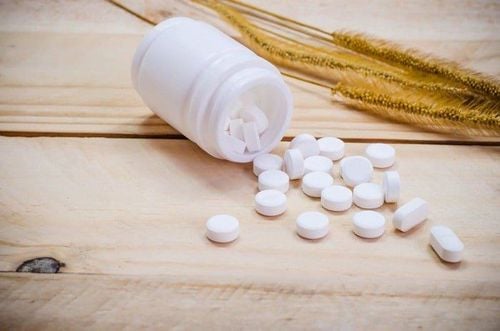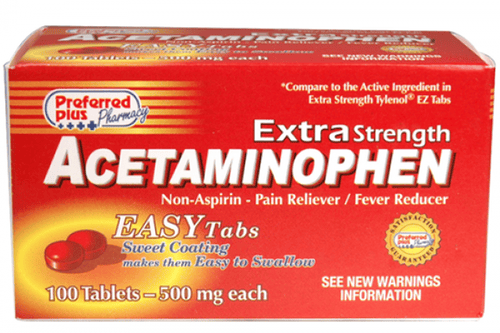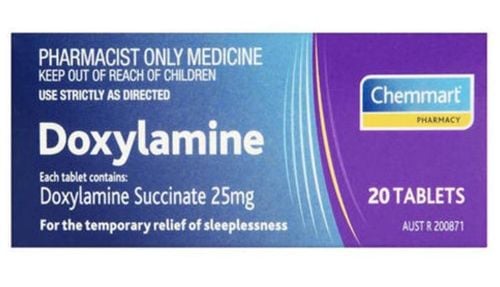This is an automatically translated article.
Glotadol cold is a combination medicine with 3 main ingredients: paracetamol, loratadine and dextromethorphan. The drug is used to quickly relieve symptoms of common colds and flu such as cough, fever, runny nose, headache,...1. What is Glotadol cold?
Glotadol cold contains 3 main active ingredients: paracetamol 500mg, loratadine 5mg and dextromethorphan hydrobromide 15mg. Paracetamol is a popular drug with fever-reducing and pain-relieving properties. Paracetamol lowers temperature through action on thermoregulatory centers in the hypothalamus. Loratadine is a 2nd generation H1 antihistamine, which helps relieve symptoms caused by allergies such as allergic rhinitis, urticaria, ... And dextromethorphan is a drug with a chemical structure related to morphine, but has no effect. pain relief and only mild sedative effect. It has the ability to relieve cough by acting on the cough center in the medulla oblongata.2. What are the effects of glotadol cold?
Glotadol Cold may be indicated for the relief of symptoms caused by the common cold and flu such as sneezing, coughing, runny nose, allergic rhinitis, itchy nose and throat, fever, headache and body aches,. ..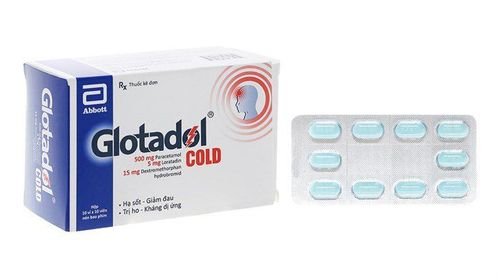
Glotadol cold có tác dụng giảm nhanh các triệu chứng cảm lạnh, cảm cúm
3. Dosage of Glotadol Cold
The drug is taken orally. Dosage of Glotadol Cold for each age group is as follows:
Adults and children over 12 years old: Take 1 tablet / time x 2 times / day Children from 6 -12 years old: Take medicine as directed by a doctor. Note that the above dosage is for reference only. The specific dose will vary depending on the condition and severity of the disease. You need to consult your doctor or medical professional before taking to know the right dosage.
4. What are the side effects of Glotadol Cold?
Paracetamol can cause mild and reversible side effects after discontinuation of the drug such as rash, erythema or urticaria, nausea, vomiting, anemia, kidney disease, hypersensitivity reactions. An overdose of >250 mg/kg or >12 g in approximately 24 hours (in children > 150 mg/kg) can cause hepatocellular destruction, leading to irreversible hepatic necrosis and death. Loratadine: Loratadine may cause headache, dry mouth, fatigue, abdominal pain, nausea, diarrhea, drowsiness. Rare side effects such as dizziness, dry nose, depression, conjunctivitis, heart palpitations, abnormal liver function, convulsions, menstrual disorders, hair loss, urticaria, ... Dextromethorphan: Dextromethorphan often causes dizziness, fatigue, tachycardia, nausea, drowsiness, gastrointestinal disturbances, abdominal pain. Central nervous system depression and respiratory depression may occur in case of overdose. Patients should stop taking the drug and consult a doctor if unusual signs such as rash appear, edema, nervousness, dizziness and insomnia or when symptoms do not improve after 7 days or are accompanied by fever.

Loratadin trong thuốc Glotadol cold có thể gây đau đầu cho một số người bệnh
5. What are the precautions when using the drug?
Use with caution in patients with liver failure or active liver disease. Caution should be exercised when taking multiple products containing paracetamol at the same time as it may cause unintentional overdose in adult and pediatric patients. Chronic drinkers should take the drug with caution. Avoid drinking alcohol during treatment because it can increase the sedative, sedating effects of dextromethorphan. Abuse of dextromethorphan can occur with high doses and prolonged use. Watch for signs of serious skin reactions such as toxic epidermal necrolysis (TEN), Steven-Johnson syndrome (SJS), or Lyell's syndrome, or acute generalized exanthematous pustulosis (AGEP) syndrome. ). Ability to drive and use machines: Because dextromethorphan can cause dizziness and drowsiness, caution should be taken when driving and operating machinery while taking the drug Pregnant women: Acetaminophen is recommended at the recommended dose. least effective for the shortest time to treat pain and fever in pregnant women. When antitussives are needed during pregnancy, dextromethorphan at standard doses is generally considered acceptable. Loratadine can also be used as needed. It is best for patients to consult a doctor before taking the drug and only use it when absolutely necessary. Use in Lactation: Paracetamol may be excreted in breast milk, but it is generally one of the relatively safe analgesics in lactating women when used at commonly recommended doses. . Loratadine is an antihistamine that can be used in nursing women. Information regarding the presence of dextromethorphan in breast milk has not been established. Therefore, it is best for the patient to consult with a doctor to weigh the benefits and risks of taking the drug, thereby making a decision to stop taking the drug or stop breastfeeding. Store the medicine in a dry place, away from direct light, at a temperature not exceeding 30 °C. In summary, Glotadol Cold is an effective medicine in the treatment of symptoms caused by the common cold and flu. Patients need to strictly follow the instructions and dosage from medical staff to avoid unwanted effects.
Please dial HOTLINE for more information or register for an appointment HERE. Download MyVinmec app to make appointments faster and to manage your bookings easily.





